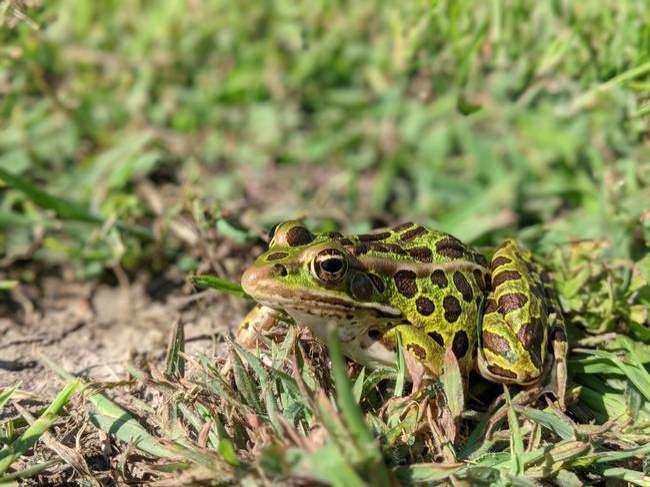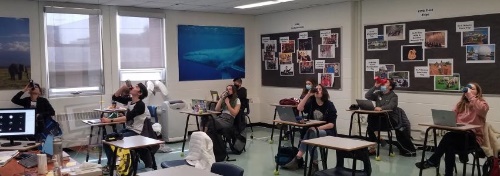371 Bloor Street West
Toronto, ON M5S 2R7 get directions
Toronto, ON M5S 2R7 get directions


On March 23 at the beginning of lunch break, several University of Toronto Schools students paused in unison, and took a sip of tap water from their reusable bottles. It wasn’t just any sip of water. This was the Great Gulp, a small yet symbolic collective gesture for a campaign by Ecoschools to celebrate World Water Day on March 22, one of many ways UTS students are learning about water issues at our school. (UTS had no classes March 22, so the event took place on March 23.)
From taking part in events like the Great Gulp to everyday learning in the classroom to joining an international partnership, water issues are very much part of the program as UTS empowers students to innovate as socially responsible global citizens.
By bringing students together to share a moment like this, our school helps raise awareness of water security and plastic waste. “Simple daily actions such as using a reuseable plastic water bottle can have a big impact on the environment,” said a video made by F1 (grade 7) students Ryan, Julia and Keshav to explain the initiative to their fellow students.
“This small gesture can potentially prevent hundreds of plastic bottles being used and further contributing to our carbon emissions in their production and recycling, or ending up in landfill, or even our waterways,” says Laura Ross, who teaches Geography and Careers/Civics at UTS, and helped Science teacher Katherine Chien launch the initiative at our school. She adds that the Great Gulp also creates a moment for reflection for our students. Here in Toronto we have safe, drinkable tap water, but she notes that many other people in the world, and even in our county, do not.
“Clean water is a fundamental human right,” says Ms. Ross. “But one in three people globally do not have access to clean water, and there are currently 38 communities in Canada without access.”
Another way UTS is enhancing education on water-related issues is by taking part in an international partnership that furthers the cause.
In late 2020, UTS joined the Zero Water Day Partnership, a collaboration of educators from middle schools around the world working with UNESCO to take action on water and sustainable development in their homes, schools and communities. UTS originally learned about the program from two alumnae, Sumin Lee ’20 and Dr. Jennifer Nguyen ’10. The name comes literally from a day without water, as nearly happened in Cape Town 2018 on April 12, when summer water levels became so low the city was nearly on its last drop.
Learning from each other is a core part of the partnership. Geography teacher Richard Cook, who is also the UTS Global Citizenship and Co-Curricular Coordinator, and Dr. Cresencia Fong, Head of Teacher Learning, Innovation and Research, have taken part in virtual meetings, learning about innovative water-learning initiatives from educators around the world, as far away as Brazil, Palestine, Scotland and Bhutan, as well as the U.S.
A key part of this partnership looks at how the health of our planet and our health are interconnected and interdependent through our mountains, viewing mountains as “the water towers of the world.”
 F1 (grade 7) student April’s entry into the Mountains as the Water Towers of the rld photo contest
F1 (grade 7) student April’s entry into the Mountains as the Water Towers of the rld photo contest
Several UTS students took part in the UN Food and Agriculture Organization’s Mountains as the Water Towers of the World photo contest, with F1 (grade 7) student April’s photo chosen to be featured on the organization's website.
In May, Ms. Ross and her F1 (grade 7) Geography class will collaborate on a small research project through the Partnership, where classes in a few countries will track water use for a week. They will share and compare results and then discuss what this means for future water conservation programs and government policy.
Already water education is an integral part of many classes at UTS. Below find a few examples of recent projects students have undertaken in class.
What can we learn from the water heroes of our time? Ms. Ross challenged her F1 (grade 7) Geography students to investigate by choosing a water hero and creating a presentation about the issues they aim to tackle, the successes and the challenges ahead. From Oceana to Environmental Defence, Water Keepers Canada to Water.rog, students explored a wide range of water issues.
Watch F1 students Christina, Olivia and Ryan’s presentation on International Rivers, an organization that protects rivers and lakes by preventing dam projects, while also protecting the rights of communities that live along the rivers.
Even in Canada, many communities lack access to safe drinking water and the majority of these are First Nations reserves. Across our country, 54 long-term drinking water advisories are in effect in 34 communities, according to Indigenous Services Canada.
In M4 (grade 10) Civics class, students discussed how issues of environmental racism come into play, and potential solutions to ensure clean drinking water is available to all Canadians.
How is the world doing so far? In 2015, United Nations Member states set out 17 sustainable development goals within the 2030 Agenda for Sustainable Development, such as take urgent action to combat climate change, conserve and sustain the oceans, and more. At UTS, S5 and S6 (grade 11 and 12) World Issues students took on the hefty challenge of evaluating progress towards some of these goals as a class project. Students Amani and Jacob evaluated the progress that is being made towards the sixth goal of clean water and sanitation in this video presentation.
These are just some of the many ways UTS brings water education to life at our school, giving students the background and knowledge they will need to become the water stewards that will be so vital to the future and health of our planet.
